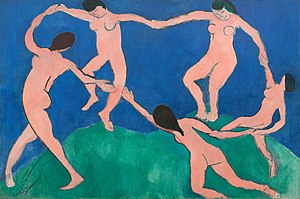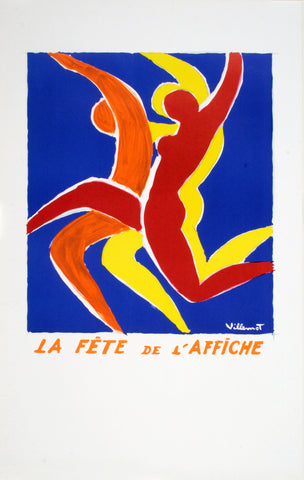The Work of Bernard Villemot

To many, Bernard Villemot (and his friend and fellow creator Raymond Savignac) represents the end of the age of the trained artist as poster designer. His work has become iconic in its innovative design and use of color. As the world began to shift in the 1960s towards ad agencies and graphic design implemented by art departments, Bernard Villemot stood firm in his belief that the only way to advertise effectively, “was to treat a poster as though it were a painting”.
Villemot was destined, in many ways, to become a poster artist. Born into a bourgeoisie family in Trouville-sur-Mer, France in 1911, Bernard was encouraged to pursue his passions by his father Jean, who was a famous cartoonist. Despite coming of age during the midst of the Great Depression, Villemot’s upper-class lifestyle allowed him many opportunities to foster his love of art and explore creating posters as a career.
In 1932, Villemot enrolled in the famous L’Ecole Paul, a school for poster artists founded and taught by famed posterist Paul Colin.
Paul Colin’s style was followed by many students at L’Ecole Paul, and Villemot was no exception. Colin’s painterly approach can be seen in this poster by him from 1930. Click on it to learn more about it.
Under the tutelage of Paul Colin, Villemot began to form principles and techniques that would follow him throughout his long career. It is at L’Ecole Paul that Villemot develops his painterly approach and simplification of forms.
In addition to the importance of Paul Colin’s school, Villemot was most heavily influenced by the work of famed Impressionist painter Henri Mattise.

I had but one model, one inspiration; Matisse.
-Bernard Villemot

It is easy to see the influence of Matisse’s nudes in this poster from 1983.
After graduating L’Ecole Paul, Villemot struggled to find poster commissions other than for films due to the economic depression. As France exited the Depression and entered into WWII, Villemot was consumed with commissions to create war-effort posters.
Between graduating school and the end of the War, the world had changed. Villemot and his contemporaries in France found themselves creating art in a country consumed with a spirit of rebuilding and re-invigoration.
This high-energy spirit can be seen in all of Villemot’s posters from the 1950s until his death in 1989.
As his career and notoriety progressed in the 1960s and 1970s, Villemot became influential enough that his painterly images and composition began to supercede the product being advertised. In fact, many of his Bally posters barely feature shoes, and his Perrier designs more prominently lovers embracing than bottled water.
We are exceptionally proud of our current collection of posters by Bernard Villemot, and encourage you to view them all by clicking here.









